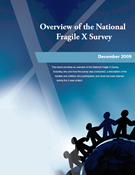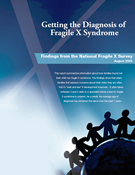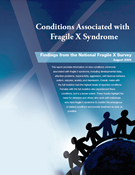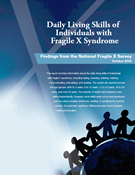Reports
Since 2007, over 1,700 families have taken part in Our Fragile X World projects. They have given important information about how fragile X affects their lives. The reports below summarize key findings from these projects.
FEATURED REPORTS
Ability to Consent to Clinical Trials in Males and Females with Fragile X Syndrome
Our Fragile X World researchers studied the ability to consent in individuals with fragile X syndrome (FXS). They wanted to learn how well individuals with FXS understand what it means to take part in a clinical trial. This information can help people decide whether to take part in a clinical trial.
Attendance at Fragile X Specialty Clinics: Facilitators and Barriers
Our Fragile X World researchers studied the differences between families who attend fragile X specialty clinics and those who do not. They wanted to understand what factors might affect families' ability to attend fragile X clinics.
School Settings of Students with Fragile X
Our Fragile X World researchers studied types of educational settings of students with fragile X, the types of support they get, and how this support affects learning.
A Comparison of Functional Academic and Daily Living Skills in Males with Fragile X Syndrome with and without Autism
Our Fragile X World researchers studied when males with fragile X syndrome master certain everyday life skills, and whether the skills of males with fragile X syndrome differ from males who have a co-diagnosis of autism.
Family Communication and Cascade Testing for Fragile X Syndrome
Our Fragile X World researchers studied how families communicate about fragile X syndrome and what factors play a role in the decision to test other children and extended family members.
Aggression in Fragile X Syndrome
Our Fragile X World researchers studied aggression in individuals with fragile X syndrome and how it affects the parents and legal guardians who take care of them.
Overview of the National Fragile X Survey
This report provides an overview of the National Fragile X Survey. The overview talks about why and how the survey was done. It also describes the families and children who took part in the survey and what was learned during the 3-year project.
Download (PDF, 413 KB)
Getting the Diagnosis of Fragile X Syndrome
This report describes how families find out their child has fragile X syndrome. We found that when families first express concerns about their child, they are often told to "wait and see" if their child’s language or behavior gets better. It often takes between three and five visits to a specialist before a child is tested for fragile X syndrome. As a result, the average age of diagnosis had stayed the same over the previous 7 years (2001-2007).
Download (PDF, 1 MB)
Conditions Associated with Fragile X Syndrome
This report gives information on nine conditions that are common in people with fragile X syndrome. These conditions include
- developmental delays (problems learning developmental skills, such as walking, talking, and playing with others)
- attention problems
- hyperactivity (higher than normal level of activity)
- aggression
- self-harm or self-injury
- autism (disorders that make it hard to communicate and form relationships)
- seizures (fits of uncontrolled movement)
- anxiety
- depression
Overall, males with fragile X had the highest levels of these conditions. Females with fragile X also had these conditions but to a lesser extent. These results show the need for doctors and other care providers to track signs of these conditions and treat them as soon as they can.
Download (PDF, 795 KB)
Daily Living Skills of Individuals with Fragile X Syndrome
This report gives information about the daily living skills of people with fragile X syndrome. These skills include eating, dressing, using the toilet, bathing, communicating, speaking, and reading. We report results across five age groups: birth to 5 years, 6 to 10 years, 11 to 15 years, 16 to 20 years, and over 20 years. Most adults had mastered many skills on their own. However, some of their skills were not as well developed. These were skills such as using complex sentences, reading, or speaking at a normal volume. As expected, differences were found between males and females.
Download (PDF, 890 KB)









